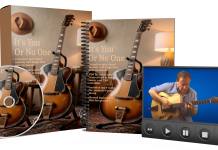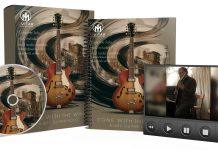This post may contain affiliate links. As an Amazon associate, Google associate as well as associate for other programs, Guitar & Music Institute may earn commissions from qualifying purchases.
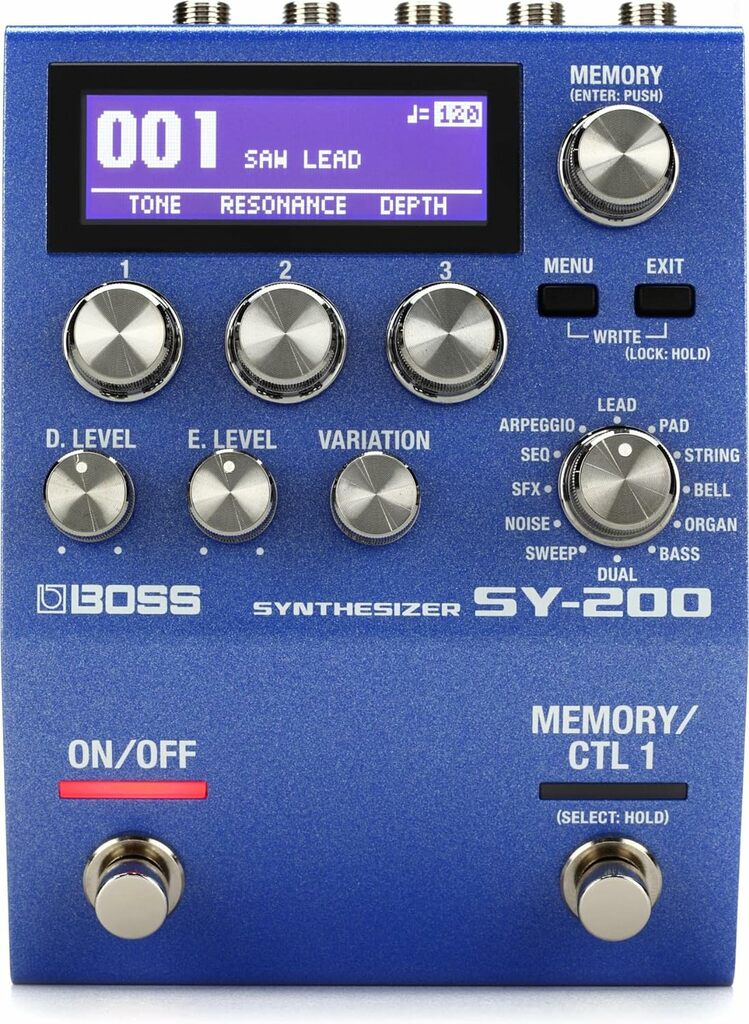
Are you a guitar enthusiast looking to expand your musical horizons? If so, you’re in for a treat. With the advancement of technology, guitar synth pedals have emerged as the next big thing in the world of music. By connecting your guitar to one of these innovative pedals, you can transform your instrument into a fully-fledged synthesizer, adding new dimensions to your playing. Say goodbye to traditional guitar limitations and enter a realm of endless creativity and sonic possibilities. In this article, we will explore the exciting world of guitar synth pedals and discuss the top options that you should consider in 2024. Whether you’re a professional guitarist, a hobbyist, or someone looking to push the boundaries of what a guitar can do, this article is your ultimate guide to tapping into a whole new musical realm. Let’s dive in and discover the potential of guitar synthesizers!
What is a guitar synth?
A guitar synth, also known as a guitar synthesizer, is a musical instrument that allows guitarists to produce sounds similar to other instruments like pianos, strings, and even horns. It combines the versatility of a guitar with the synthesizer technology, creating a whole new world of sonic possibilities.
Unlike traditional guitars, guitar synths use specialized pickups that capture the vibrations of the strings and convert them into electrical signals. These signals are then processed by the synthesizer module, which generates different sounds based on the player’s input. With a guitar synth, musicians can create rich layers of harmonies, experiment with unique tones, and even imitate the sounds of multiple instruments simultaneously.
One of the greatest advantages of a guitar synth is its ability to expand a guitarist’s creative boundaries. It opens up endless possibilities for sound manipulation and experimentation, allowing musicians to venture into unconventional genres and styles. By combining the expressiveness of a guitar with the extensive sound libraries available in synthesizers, guitarists can create complex and textured compositions.
Guitar synths have been utilized by musicians across various genres, from rock and jazz to electronic and experimental music. They have revolutionized the way guitar is played and have become a valuable tool for those seeking to push the boundaries of traditional guitar playing.
How does a guitar synth pedal work?
A guitar synth pedal is a compact stompbox that connects to your guitar and transforms your analog guitar signal into a digital one. It works by using various technologies such as pitch tracking and waveform generation to analyze the pitch and frequency of the guitar signal and then generate a corresponding synthesizer sound.
The pedal captures the notes you play on the guitar and converts them into MIDI (Musical Instrument Digital Interface) data, which is a standard protocol for communicating musical information between devices. This MIDI data is then sent to a synthesizer engine or a sound module, which generates the desired sound. The sound can range from classic synthesizer tones to intricate layered textures and even reproduce the sounds of other instruments.
The guitar synth pedal provides guitarists with a wide range of controls to shape their synthesized sounds. These controls include parameters such as attack, decay, sustain, release, filter cutoff, resonance, and modulation options. With these controls, guitarists can shape their synth sounds to fit their musical vision, whether they want a smooth pad sound or a biting lead tone.
Do guitar synth pedals track chords?
The answer is yes, but with some limitations. Guitar synth pedals use advanced tracking technology to convert the audio signal from the guitar into MIDI data, which is then used to generate synthesizer sounds. While these pedals are typically quite accurate when it comes to tracking single notes, they can struggle with tracking chords consistently.
The main issue lies in the complexity of chords. Since chords involve multiple notes played simultaneously, the tracking technology in guitar synth pedals can sometimes get confused. This can result in certain notes within the chord being missed or incorrectly interpreted, leading to a less-than-ideal sound. However, it’s worth noting that advancements in technology have led to improved tracking capabilities, with some pedals now able to accurately track chords to a certain extent.
Guitar synth pedals do have the ability to track chords, but their accuracy can vary. While they may struggle with more complex chord voicings, especially with fast and intricate playing, they can still provide satisfactory results for simpler chord progressions. It’s always a good idea to test different pedal models and experiment to find the one that best suits your playing style and musical needs. With the right pedal and some practice, playing chord progressions with a guitar synthesizer can open up a whole new world of creativity and sonic exploration.
BOSS Roland Guitar Synth
The Roland GR-55 Guitar Synth is a fantastic addition to any guitar player’s arsenal. With its impressive range of synth sounds and effects, this synth delivers unparalleled versatility and creativity. It allows guitarists to explore new sonic territories and easily integrate synth tones into their playing.
The GR-55 offers a wide variety of high-quality sounds, from realistic piano and brass to futuristic synth pads and leads. It also includes a number of customizable effects, allowing users to shape their sound with precision. The built-in phrase looper is a great feature for creating layered compositions or practicing improvisation.
One downside to note is that the GK-3 pickup is not included with the GR-55, so guitarists will need to purchase it separately to fully utilize the synth’s capabilities. However, once the pickup is installed, the GR-55 becomes a powerful tool that opens up endless possibilities for sound exploration. Overall, the Roland GR-55 Guitar Synth is a must-have for guitarists looking to expand their sonic horizons.
Simple, intuitive interface
Decent built-in sounds for guitarists
910 different synth, guitar, and amp sounds
Complex to use
Can be a hassle to program
Size: 21.4 x 13.5 x 6.7 inches
Weight: 7.7 pounds
USB: Type B
Effect Types: 93
Model: GR-55
Design: Multicolor
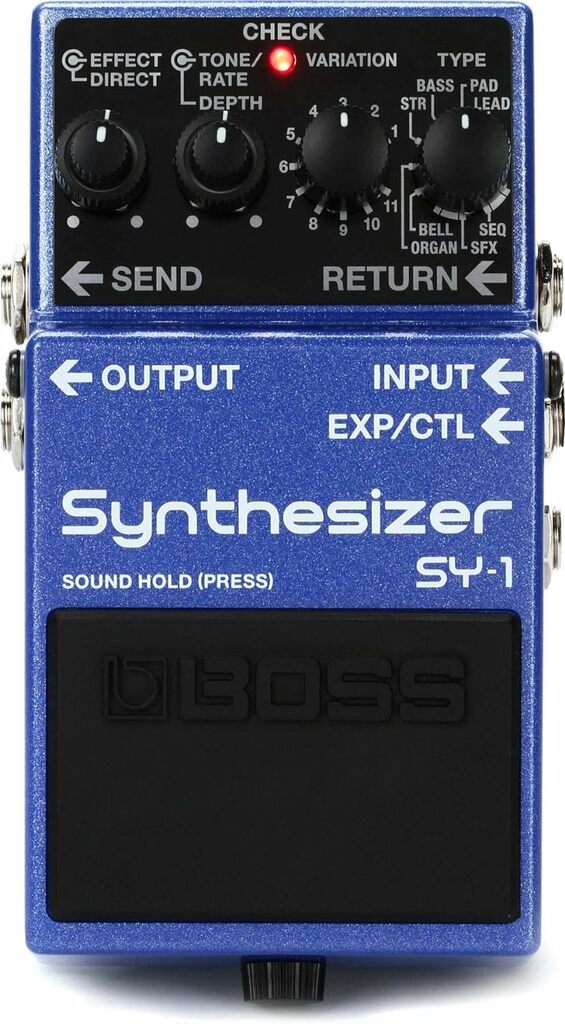
BOSS SY-1 Pedal
The Boss SY-1 Guitar Synthesizer Pedal, available at the BOSS Store, is a game-changer for any guitarist looking to explore new sonic possibilities. This pedal takes guitar synthesis technology to a whole new level, offering a wide range of synth sounds that can be seamlessly integrated into any guitar rig. Whether you’re looking for lush pads, gritty lead tones, or funky synth bass lines, the SY-1 has got you covered.
One of the standout features of the SY-1 is its ease of use. With simple controls and an intuitive interface, even beginners can start creating awesome synth sounds in no time. The pedal also responds well to different playing styles, making it a versatile tool for both live performances and studio recordings.
In conclusion, the Boss SY-1 Guitar Synthesizer Pedal is a must-have addition to any guitarist’s pedalboard. Its impressive sound quality, user-friendly design, and competitive price point make it a true winner. Whether you’re a seasoned pro or just starting your musical journey, the SY-1 will surely spark your creativity and elevate your guitar playing to a whole new level.
No programming required
Compact size
Great sounds, even for non-guitarists
Few user presets, small display
No MIDI
Color: Blue
Weight: 1.2 Pounds
Style: Guitar/Bass
Loop: Yes
Voltage: 9 Volts
Type: Pedal
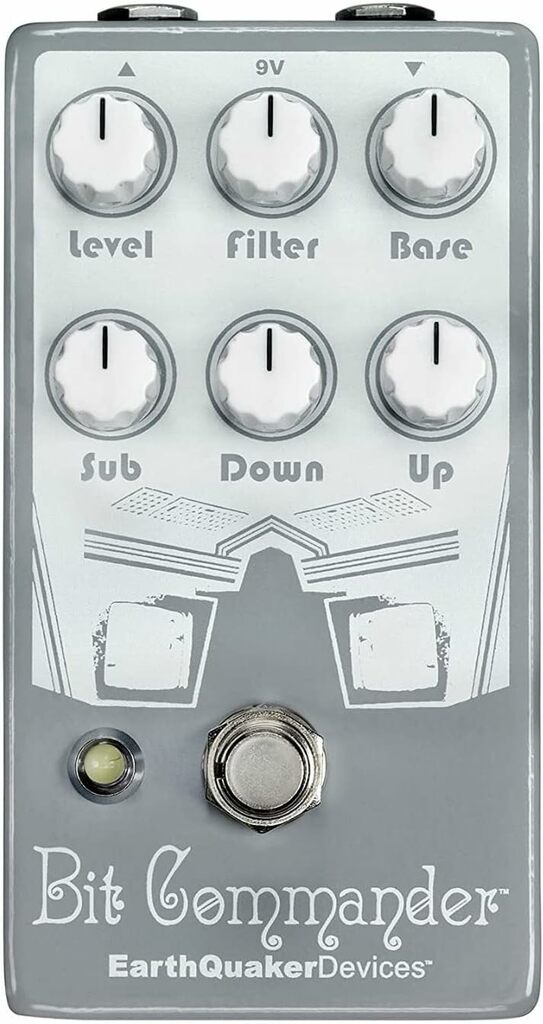
Earthquaker Devices Bit Commander V2 Pedal
The EarthQuaker Devices Bit Commander V2 Monophonic Analog Guitar Synthesizer Pedal is an exceptional product that will take your guitar playing to a whole new level. This pedal falls under the category of Pitch & Octave and is the perfect choice for musicians looking to incorporate unique and experimental sounds into their playing.
With its intuitive design and high-quality construction, the Bit Commander V2 delivers a range of captivating synthesizer sounds that will leave you mesmerized. Whether you’re looking for gritty and distorted tones or smooth and melodic sounds, this pedal has it all. The controls are highly responsive, allowing you to effortlessly shape the pitch and octave parameters to suit your individual style.
Additionally, the EarthQuaker Devices brand is known for its commitment to excellence, and this product is no exception. Built to withstand the rigors of the road, the durable construction ensures that the Bit Commander V2 will last for years to come. Overall, the EarthQuaker Devices Bit Commander V2 Monophonic Analog Guitar Synthesizer Pedal is a must-have for any guitarist looking to explore new sonic possibilities.
Improved interface
New Tone control
Good for bass or guitar
All analog, baby!
No power adapter included
No battery option
Weight: 14.1 ounces
Color: Silver
Signal Format: Analog
Style: Bit Commander
Voltage: 9
Type: Guitar Pedal

Boss SY-200 Guitar Synthesizer
The Boss SY-200 Guitar Synthesizer Pedal is an impressive addition to any guitarist’s rig. As a versatile guitar synthesizer, it offers a wide range of sonic possibilities that can elevate a player’s creativity to new heights. Designed with exceptional precision, it seamlessly tracks your guitar’s pitch and instantly converts it into synthesizer sounds, from rich pads to funky leads.
The pedal’s user-friendly interface allows for easy navigation through its various sounds and controls, ensuring that even novice users can dive right in and start experimenting. It also includes an expression pedal input, allowing for dynamic control over parameters such as pitch bend and filter sweeps. Built with durability in mind, the pedal is rugged and roadworthy, making it suitable for the demands of gigging musicians. With the Boss SY-200 Guitar Synthesizer Pedal, endless sonic explorations beckon at your fingertips.
Tone shaping is still very hands-on, with plenty of parameters to adjust
Expression pedal input
Up to 171 sounds with Tone capsules
Can create custom synth sounds based on your guitar’s signal
Good expression pedal options
Synth sounds don’t track well on low-E string
Few user-adjustable parameters
Weight: 2.42 pounds
Power: 9 V
Interface: Micro USB
Style: Bass,Synthesizer,Expression,Advanced
Signal: Analog
Size: 7.85 x 6.75 x 4.35 inch
Loop: Send/Return
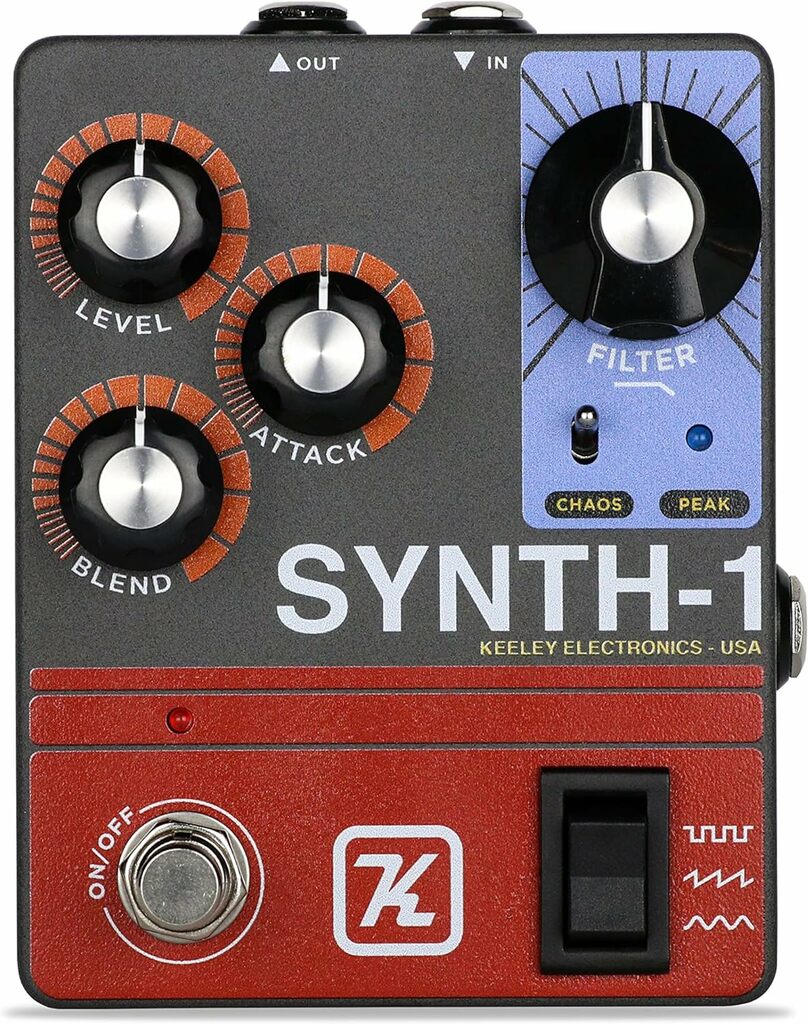
Keeley KSynth1 Fuzz Wave Generator
The Keeley Synth-1 Reverse Attack Fuzz Wave Generator Pedal in Gray is a true game-changer for guitarists looking to add unique and experimental sounds to their music. This pedal, designed by the renowned Keeley brand, falls under the Distortion & Overdrive category and truly lives up to its reputation. With its reverse attack feature, it allows users to create dynamic and expressive tones that are unmatched in the market.
The pedal’s controls are intuitive and easy to navigate, allowing users to sculpt their desired sound effortlessly. It provides an array of fuzz and wave options, giving musicians the freedom to explore various sonic landscapes. Whether you’re experimenting with psychedelic sounds or searching for a versatile pedal to enhance your existing setup, the Keeley Synth-1 is the perfect choice. Its exceptional build quality ensures durability, making it the ideal companion for both live performances and studio recordings. Overall, this pedal is a must-have for any guitarist looking to push their boundaries and ignite their creativity.
Blend control allows for sweeping textures with- or without-your dry signal
Parametric and flexible filter section
Not great for chord playing
Can be finicky to dial in
Design: Cube (3 x 3 x 3 in.)
EQ & tone: Changeable
Type: Single Note Wave
Voltage: 9 V
Color: Gray
Style: Filter,Expression
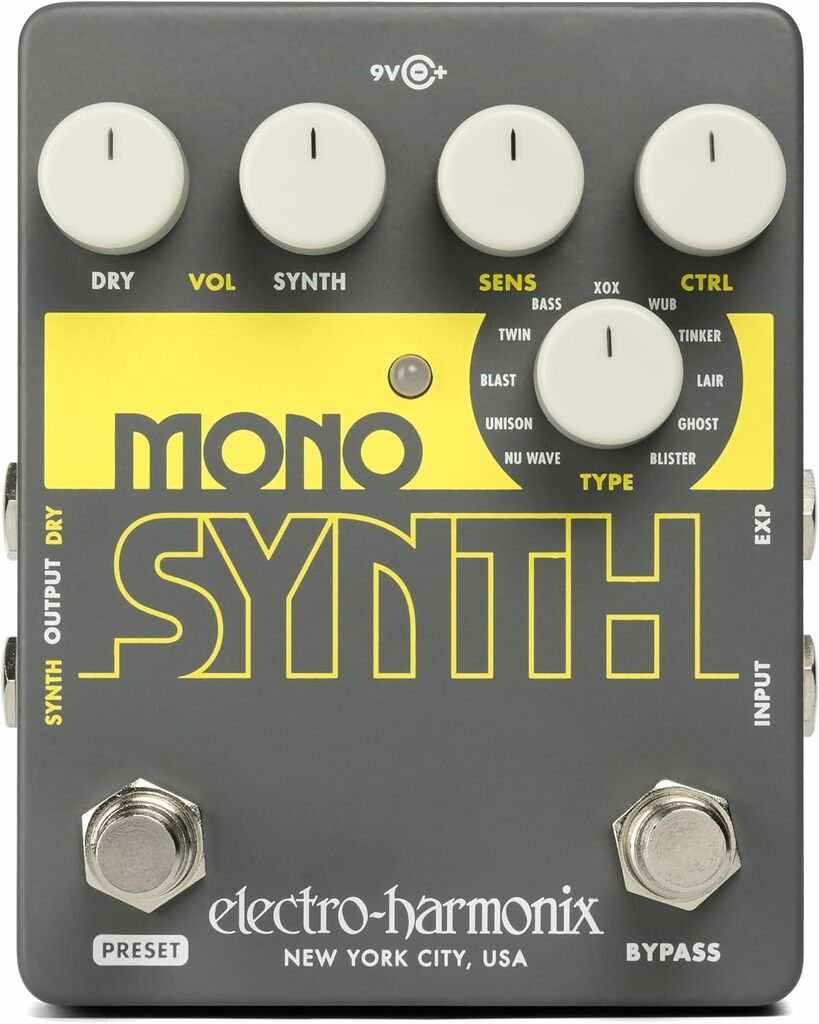
Electro-Harmonix Wah & Filter Pedal
The Electro-Harmonix Mono Synth Guitar Synthesizer Pedal is a game-changer for guitarists looking to explore new sonic territories. As a wah and filter pedal, it delivers incredibly versatile and expressive tones that add depth and character to any performance. The pedal features four different synth modes, each with its own unique sound and range. From classic synth leads to funky basslines, the Mono Synth offers endless possibilities for creative exploration. The build quality is solid, and the user-friendly interface makes it easy to dial in the desired settings. Whether you’re a guitar enthusiast or a seasoned professional, this pedal is a valuable addition to any arsenal.
Filter and voice presets can be easily saved
Controls can be used to create a wide variety of synth sounds
11 user presets
Plenty of tweakability with the four main controls and EXP input
Vintage and modern synth sounds
No onboard presets
No separate outputs for dry and synth sounds
Controls: Easy to use
Style: Guitar Synthesizer
Input: EXP pedal
Size: 4.75 x 4 x 2.25 inches
Voltage: 9.6 V
Presets: Eleven
Signal Format: Analog
Do you need a special pickup for a guitar synth pedal?
The answer to this question depends on the specific guitar synth pedal you’re using. Some pedals are designed to work with any standard electric guitar, meaning you don’t need a special pickup to use them. These pedals often rely on the guitar’s natural tone and signal to produce the desired synth effect. In this case, as long as your guitar has a good set of pickups that capture the nuances of your playing, you’re good to go.
On the other hand, there are guitar synth pedals that require a specialized pickup to function properly. These pickups are specifically designed to track your guitar’s signal more accurately and send it to the pedal for processing. Since guitar synthesizers rely on tracking the notes you play, having a high-quality tracking pickup is important to ensure accurate and responsive synth sounds.
Ultimately, whether you need a special pickup for your guitar synth pedal depends on the pedal itself and your desired sound. If you’re just starting out and experimenting with synth sounds, you can generally get by with a standard electric guitar and its stock pickups. However, if you want to dive deeper into the world of guitar synthesizers and want the best possible tracking and response, investing in a specialized pickup may be worth considering.
Can I use multiple effects with guitar synth pedals?
One common question that arises among guitarists is whether it is possible to use multiple effects with guitar synth pedals.
The answer to this question is a resounding yes. Guitar synth pedals are designed to be versatile and flexible, allowing for the use of various effects simultaneously. This means that you can experiment with combinations of distortions, delays, reverbs, and other effects to create your own personal sound.
Using multiple effects with guitar synth pedals can enhance and shape the synthesized tones in different ways. For example, adding a delay effect can create a sense of space and depth, while a distortion effect can add grit and aggression to the synth sound. By manipulating different effects, guitarists can unlock a whole new palette of sounds and textures.
It is important to note that the order and placement of effects can greatly impact the overall sound. Experimenting with different signal chains can yield different results. Some guitarists prefer placing the synth pedal before the effects chain, while others prefer placing it at the end. Finding the right combination and placement of effects can take time and experimentation, but the possibilities are endless.
Does MIDI matter when choosing a guitar synth pedal?
The answer to this question depends on the individual guitarist’s needs and preferences. MIDI can be a valuable feature for those who want to integrate their guitar synth pedal with other MIDI devices, such as keyboards or drum machines. It allows for greater control and flexibility in creating complex musical arrangements and can enhance the overall performance experience.
However, for guitarists who primarily use their guitar synth pedal as a standalone unit, MIDI may not be a crucial factor to consider. Most modern guitar synthesizers offer a wide range of built-in sounds and effects, eliminating the need for MIDI connectivity. In this case, the focus should be on the pedal’s sound quality, playability, and ease of use instead.
That being said, it’s worth noting that MIDI capabilities can open up a world of possibilities for creative experimentation. With MIDI, guitarists can trigger different sounds and effects using their guitar as a controller, or even use it to control external MIDI devices. This can be particularly appealing to those who enjoy pushing the boundaries of their musical expression.
What are the best guitars and amps for synth sounds?
While there are several options available, some guitars and amps are particularly well-suited for this purpose. One option to consider is a guitar synthesizer. A guitar synthesizer allows you to combine the versatility of a guitar with the unique sounds of a synth. Popular models include the Roland GR-55 and the Boss SY-300. These devices track the notes played on the guitar and convert them into synth sounds, giving you endless possibilities for creating a wide range of tones.
In terms of guitars, there are a few models that stand out for their ability to achieve great synth sounds. The Fender Stratocaster is a popular choice among guitarists looking to explore synth tones. This iconic guitar is known for its versatile sound and comfortable playability. Another option to consider is the Ibanez RG series. These guitars are renowned for their fast playability and high-output pickups, making them an excellent choice for achieving synth-like tones.
When it comes to amplifiers for synth sounds, there are a few options worth considering. One standout brand is the Marshall JVM series. These amps are known for their versatility and have a wide range of settings that allow you to shape your tone to perfection. The Fender Twin Reverb is another popular choice among guitarists looking to achieve synth-like tones. Known for its clean and warm sound, this amp provides a solid foundation for creating a synth-inspired sound.
In conclusion, if you’re looking to create synth sounds on a guitar, investing in a guitar synthesizer can open up a whole new world of possibilities. Instruments such as the Roland GR-55 and Boss SY-300 are highly regarded for their ability to convert guitar signals into epic synth tones. Pairing these synthesizers with guitar models like the Fender Stratocaster or Ibanez RG series can further enhance your ability to achieve a wide range of sounds. Lastly, amplifiers from brands such as Marshall and Fender can provide the ideal platform for shaping and amplifying your synth-inspired tones.
This post may contain affiliate links. As an Amazon associate, Google associate as well as associate for other programs, Guitar & Music Institute may earn commissions from qualifying purchases.



